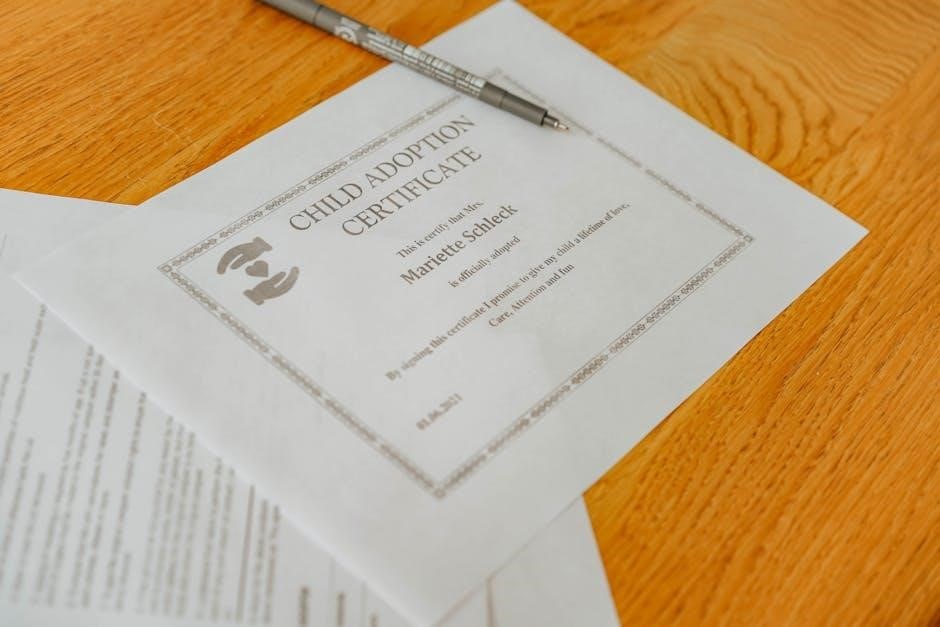A blank ServSafe certificate PDF is a customizable template used to issue food safety certifications. It ensures proper documentation, verifying successful completion of training and exams.
Understanding the Purpose and Importance
A blank ServSafe certificate PDF serves as a vital tool for food safety training programs. Its purpose is to provide a standardized format for issuing certifications, ensuring compliance with health regulations. The importance lies in verifying that individuals have completed necessary training and exams, demonstrating their knowledge of food safety practices. This certification is crucial for maintaining trust and credibility in the food industry, ensuring safe food handling and preventing foodborne illnesses. It also helps businesses meet legal requirements and industry standards effectively.
Structure and Key Elements of the Certificate
A blank ServSafe certificate PDF typically includes essential elements such as the recipient’s name, certificate number, date of issuance, and expiration date. It also features the ServSafe logo and official signatures, ensuring authenticity; The structure is designed to be clear and professional, with designated fields for customization. These elements verify the holder’s completion of food safety training and their understanding of critical practices. The standardized format helps maintain consistency and legitimacy across all issued certifications. Proper authentication is ensured through these key details.
Why Businesses Need Blank ServSafe Certificates
Blank ServSafe certificates enable businesses to efficiently issue food safety certifications, ensuring compliance with health regulations and maintaining trust with customers and regulatory authorities.
Ensuring Compliance with Food Safety Regulations
Blank ServSafe certificates are essential for compliance with food safety regulations. They provide proof of employee training, ensuring adherence to health standards. By using these templates, businesses can maintain accurate records, demonstrate accountability, and avoid legal repercussions. Proper documentation is crucial for audits and inspections, ensuring the safety of food handling practices. This compliance not only protects public health but also upholds the business’s reputation and operational integrity.
Building Trust and Credibility with Customers
Displaying valid ServSafe certificates fosters trust and credibility with customers. It signals a commitment to food safety and professionalism. When businesses use blank templates appropriately, they demonstrate transparency, ensuring customers feel confident in their food handling practices. Misuse or forgery, however, can damage reputation and customer loyalty. Proper management of certificates is vital to maintaining trust and showcasing a business’s dedication to safety and quality.

How to Obtain a Legitimate ServSafe Certificate
To obtain a legitimate ServSafe certificate, enroll in an approved course, complete the training, and pass the certification exam. Download your certificate post-exam.
Step-by-Step Process for Certification
Register for a ServSafe certification course through an approved provider. 2. Complete the required training modules, covering food safety, handling, and regulations. 3. Schedule and take the certification exam, ensuring you meet the passing score. 4. Upon passing, download your certificate from the ServSafe portal. 5. Print or save the PDF for workplace verification. This process ensures compliance with food safety standards and workplace requirements.
Training and Examination Requirements
To obtain a ServSafe certification, individuals must complete an approved training program and pass a proctored exam. Training covers food safety principles, handling practices, and regulatory compliance. The exam tests knowledge through multiple-choice questions, requiring a minimum passing score. Upon successful completion, a digital certificate is issued, which can be downloaded as a PDF. This process ensures that certificate holders demonstrate a solid understanding of food safety standards and protocols.

Search and Verification of ServSafe Certificates
ServSafe certificates can be searched and verified online using the last name or certificate number. This ensures authenticity and compliance with food safety standards.
Using Online Tools for Certificate Validation
Online tools allow quick verification of ServSafe certificates using the certificate number or last name. These platforms ensure authenticity, helping employers maintain compliance and trust. Regular validation prevents fraud and ensures food safety standards are upheld. Accessible 24/7, these tools streamline verification processes, reducing administrative burdens. Employers can easily confirm certifications, ensuring workplace credibility and adherence to regulations. This digital approach enhances transparency and efficiency in managing food safety certifications.
Importance of Verification in Maintaining Standards
Verification ensures authenticity, preventing fraudulent certificates and maintaining trust in food safety. It guarantees employees meet training requirements, reducing risks of non-compliance. Validating certifications protects public health by ensuring proper food handling. This process upholds industry standards, credibility, and legal compliance. Regular checks prevent misuse, fostering a safe and reliable food environment. Employers must verify certificates to avoid penalties and ensure all staff are qualified, safeguarding their reputation and customer health. Verification is crucial for operational integrity and accountability.

Common Issues with Blank ServSafe Certificates
Blank ServSafe certificates often lead to misuse or forgery, compromising food safety standards. Lost or missing certificates can disrupt verification processes, creating operational challenges for businesses. Additionally, improper distribution may result in unauthorized individuals obtaining credentials, undermining the integrity of the certification system and posing legal risks to employers. Regular monitoring and secure storage are essential to mitigate these issues and ensure compliance with food safety regulations. Effective management practices, such as digital tracking and secure issuance, can help prevent these problems and maintain the credibility of the ServSafe certification process.
Lost or Missing Certificates
Losing or misplacing a ServSafe certificate can create significant challenges for both individuals and businesses. Without proper documentation, employees may face barriers to employment or promotion, while establishments risk non-compliance with food safety regulations. To address this, many turn to blank ServSafe certificate PDFs as a temporary solution. However, these must be used cautiously to avoid misuse. Organizations should implement secure storage systems and offer streamlined processes for reissuing certificates to mitigate these issues effectively and maintain operational continuity. Proper record-keeping and digital backups are essential.
Troubleshooting Certificate Availability
Certificate availability issues often arise due to lost or missing documents, expired certifications, or technical difficulties accessing ServSafe systems. Utilizing blank ServSafe certificate PDFs can provide temporary solutions, but authenticity must be ensured. If a certificate is unavailable, individuals should contact ServSafe support or their training provider for assistance. Regular checks and digital backups can prevent future disruptions. Ensuring timely renewals and maintaining accurate records are crucial for uninterrupted compliance and operational efficiency in food safety management. Proper documentation is key to resolving availability challenges effectively.

Legal Implications of Blank ServSafe Certificates
Misusing a blank ServSafe certificate PDF can lead to legal consequences, including forgery charges. Ensuring authenticity is crucial to avoid penalties and maintain workplace integrity.
Consequences of Misuse or Forgery
Misusing or forging a blank ServSafe certificate can result in severe legal repercussions, including fines and criminal charges. Businesses may face loss of reputation, legal penalties, and operational shutdowns. Employees found using counterfeit certificates can be terminated and face professional blacklisting. Additionally, such actions undermine food safety standards, risking public health and trust. Legal consequences extend to both individuals and organizations, emphasizing the importance of maintaining certificate authenticity and integrity in the food industry.
Ensuring Authenticity in the Workplace
Ensuring authenticity of ServSafe certificates is crucial for maintaining workplace integrity. Employers must verify certifications through official channels to prevent fraudulent documents. Secure storage of blank templates and strict access controls can prevent misuse. Regular audits and digital validation tools help confirm certificate legitimacy. Training staff to recognize authentic certificates further strengthens compliance. Failure to maintain authenticity can lead to legal and reputational risks, emphasizing the need for vigilant oversight in handling ServSafe certifications.

Best Practices for Managing ServSafe Certificates
Organize certificates securely, conduct regular audits, and train staff on proper handling. Use digital storage for easy access and verification, ensuring compliance and reducing fraud risks effectively.
Organizing and Storing Certificates
Effective organization and storage of ServSafe certificates are crucial for compliance and quick access. Use digital platforms or secure files to store both physical and electronic copies. Implement a centralized system with clear labeling and regular backups. Ensure only authorized personnel can access sensitive information to prevent misuse. Regularly update records and archive expired certificates properly. This maintains order and supports efficient verification processes, reducing risks of loss or forgery significantly.
Regular Updates and Renewals
Regular updates and renewals of ServSafe certificates are essential to maintain compliance with evolving food safety standards. Certifications typically expire after five years, requiring renewal through updated training and exams. Employers should track expiration dates to ensure continuous compliance. Digital platforms often provide reminders and streamlined renewal processes. Staying current ensures employees possess the latest knowledge, reinforcing workplace safety and credibility. Regular updates also help address emerging food safety challenges, keeping businesses aligned with industry best practices and regulatory requirements effectively.

The Future of ServSafe Certificates
The future of ServSafe certificates lies in digital transformation, enhancing accessibility and security. Online platforms will streamline issuance and verification, reducing fraud and ensuring compliance with food safety standards.
Digital Transformation and Online Accessibility
Digital transformation is revolutionizing ServSafe certificates, making them more accessible and secure. Online platforms now offer instant issuance, reducing paperwork and streamlining verification processes. Mobile-friendly formats ensure certificates are easily accessible from any device, while digital signatures enhance authenticity. This shift not only improves efficiency but also aligns with modern workplace demands, ensuring food safety certifications are readily available and verifiable in real-time, benefiting both businesses and employees alike.
Enhanced Security Features in Certificates
Modern ServSafe certificates incorporate advanced security features to prevent forgery and ensure authenticity. These include unique watermarks, holograms, and embedded digital signatures. QR codes linked to verification databases add an extra layer of validation. These enhancements protect against misuse, maintaining the integrity of food safety certifications. Businesses can verify credentials instantly, reducing fraud risks and ensuring compliance with health regulations. Enhanced security features uphold the credibility of ServSafe certifications in the food industry;